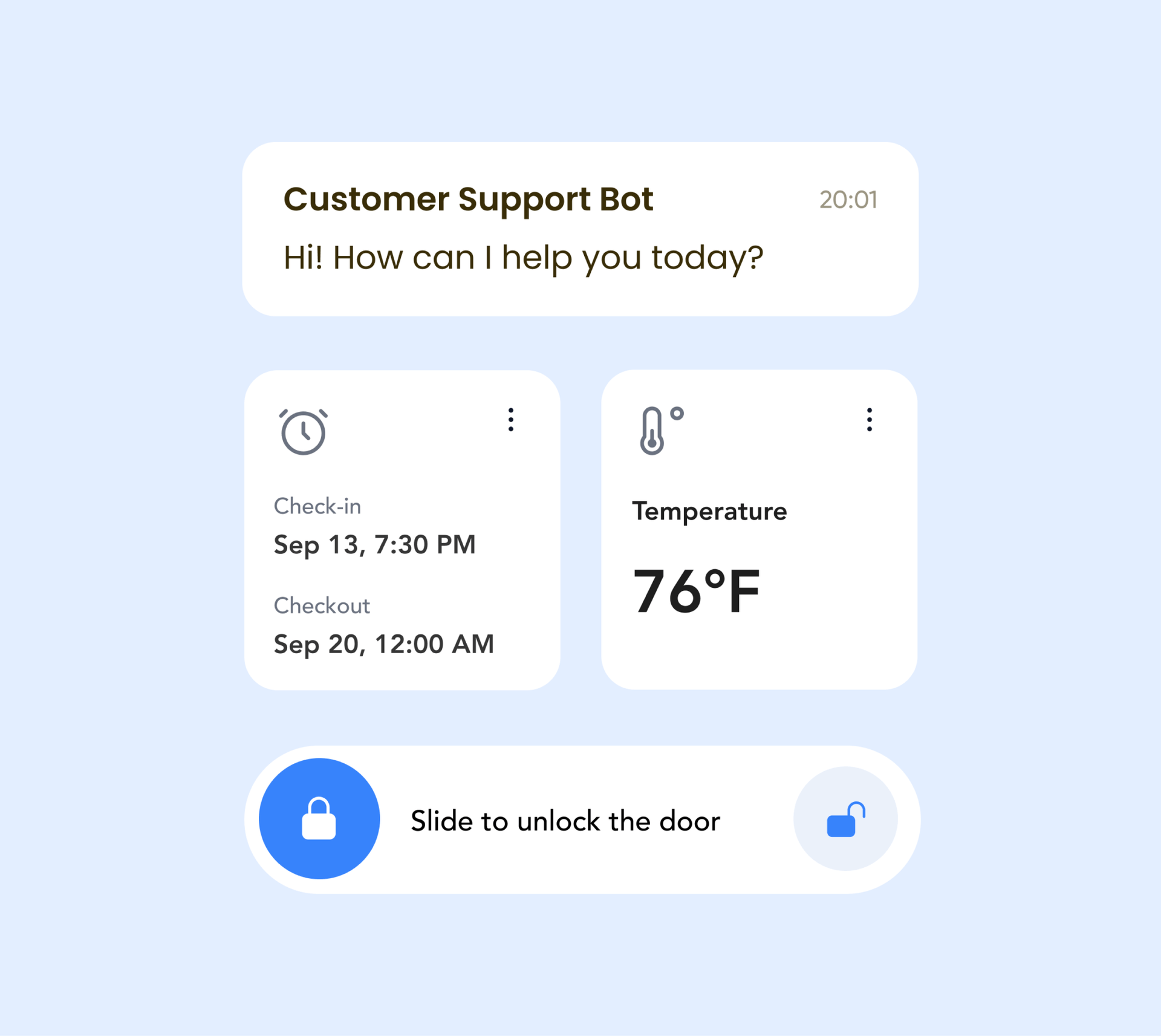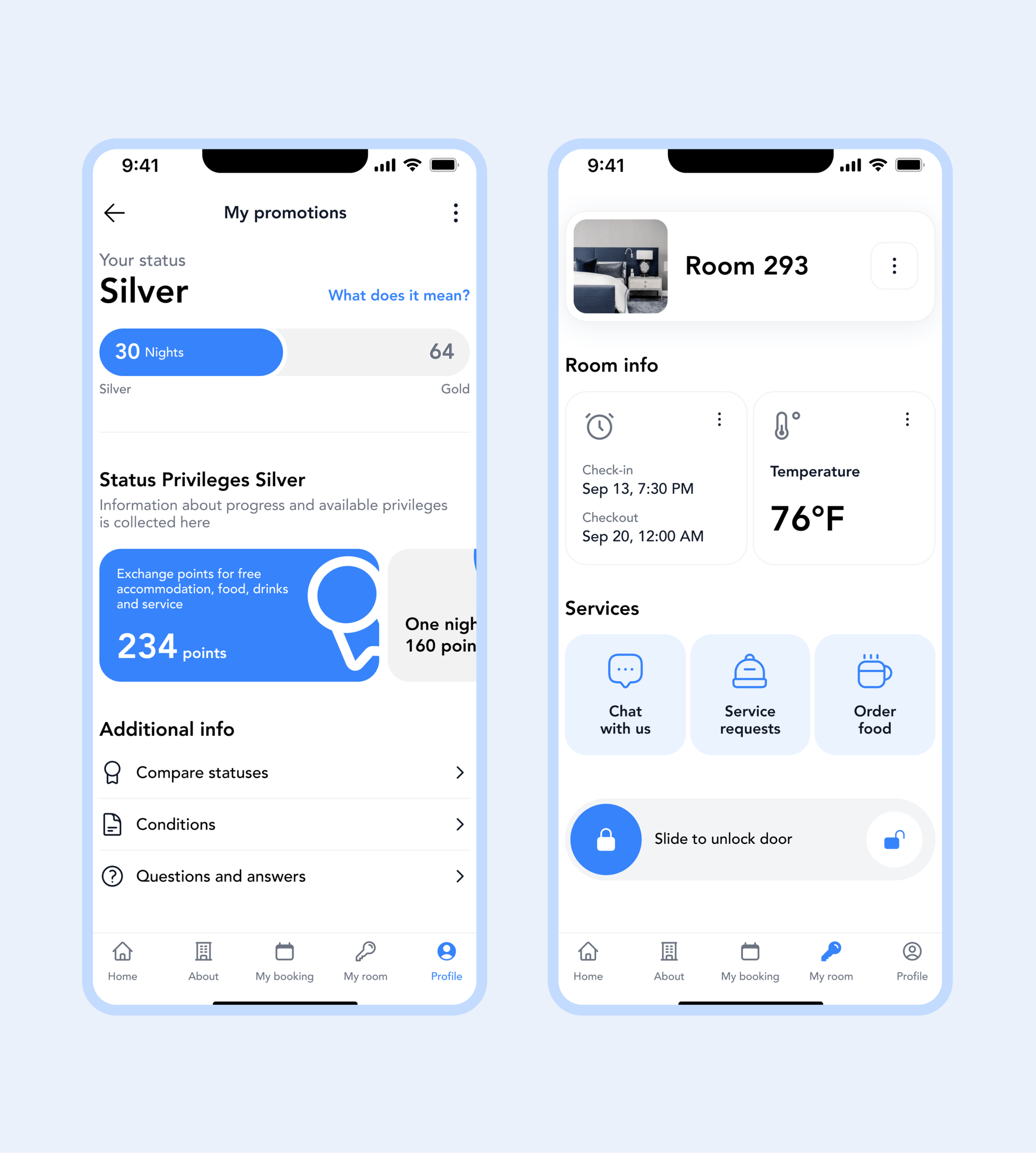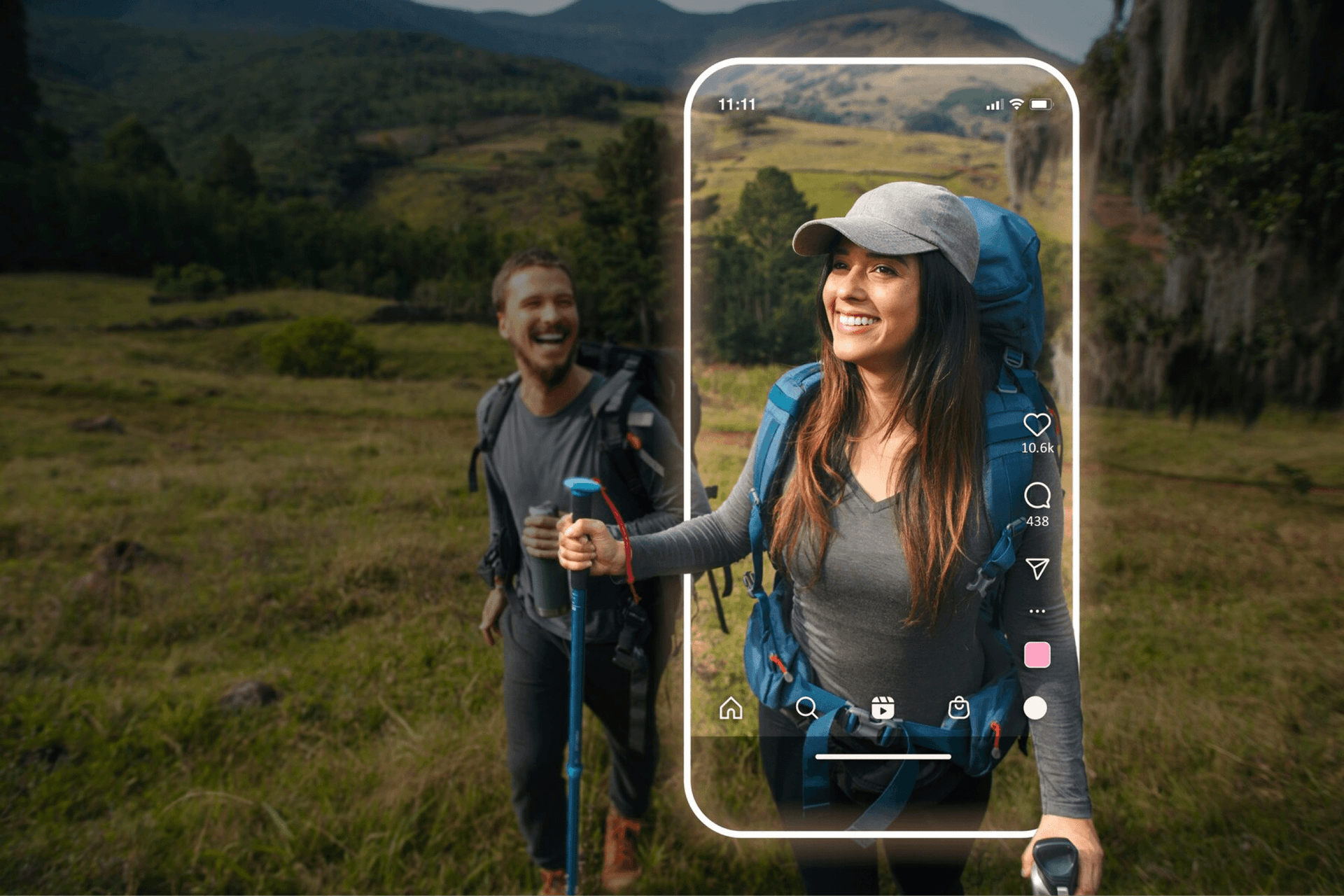14 travel app trends and insights for 2025
Alex Ragin
Updated Jan 19, 2025 • 15 min read

In this article
Just like in previous years, the travel industry will certainly be heavily influenced by travel apps in 2025. Nowadays, travel businesses have to focus on quality and value as much as quantity of services and products, which means creating personalized experiences and offering seamless travel services, sustainable initiatives, and cutting-edge technologies. It’s all about redefining the way travelers plan, embark on, and cherish their journeys.
For the tourism app development in particular, the focus is now on building apps that stand out in the competitive app landscape, and seeking creative ways to optimize user journeys with user-centric innovations. As a travel company looking to develop travel app, new trends and emerging technologies should definitely be at the top of your research list.
Let Zoftify help you out. We’ve put together a list of 14 global travel app trends that you can jump on to create the best travel app in 2025.
Mobile app trends for 2025
When it comes to tourism app trends, we’re going to list the ones that we believe will have the biggest impact on tourism businesses and the industry as a whole. But as with all trends, they come and go — look what happened to blockchain technology, "smart contracts", and NFTs — so make sure to keep an ear to the ground so you’re always up to date with what’s happening in the travel app space.
Now, let's learn about our first contender in the travel mobile app trends to watch in 2025!
Personalization
Modern travelers are already accustomed to tailored experiences, so personalization is absolutely expected from any travel company. Coincidentally, travel apps are unparalleled when it comes to providing customers with personalized experiences.
That’s because travel apps learn everything about user preferences and collect valuable behavioral and demographic data. Using the data collected, apps can upsell services and highlight personalized offers for leisure and business travel, like deals on flight options, car rentals, local attractions, or travel experiences that the user is bound to love. In fact, users are much more likely to make purchases when they get relevant suggestions. These tailored suggestions can be promoted through push notifications.
Personalization is key. It allows an online travel agency to increase its revenue and customer loyalty, because users are more likely to keep your travel app on their phone if they can see that it provides personal value to them. Luckily, travel apps make personalization possible, way beyond the capabilities of a website.
Of course, personalization isn't a new thing, but it’s certainly a priority in the travel industry now and will continue to be in the future. Keeping personalization at the forefront when developing your travel app is a smart move.
Mobile payments
Mobile payments are definitely one of the top mobile travel trends. In fact, it’s safe to say that they are a standard in the travel apps industry and will remain essential in 2025. From the moment COVID-19 emerged and up to this day, quick and convenient mobile payments remain one of the best features of any travel app, as they simplify the whole booking process and increase profits for app owners.

If you’re thinking of developing any type of booking app in 2024, there’s absolutely no way you can do without mobile payment gateways. Whether travelers wish to book flights, hotel rooms, or whole business trips, mobile payments are still the optimal choice as they provide a seamless experience.
With mobile payments and mobile wallets, users can pay from anywhere, anytime, using pre-stored card details, in just a couple of taps on the screen. Now, this level of convenience is something customers expect, so it's a new standard you have to meet.
Depending on your travel policies, we recommend enabling Stripe, Apple Pay, and Google Pay. While it can be a bit tricky to implement the required safety features for taking mobile payments, an experienced development company like Zoftify will know how to build travel apps with mobile payment gateways set up properly and securely, in accordance with the guidelines of the Google Play and Apple App Store.
Want to learn more about current trends for mobile apps?
Reach out to our team and we'll share our expertise.
Artificial intelligence
Artificial intelligence was big news in 2023, especially in the second half, with almost every industry in the world feeling its presence. Numerous startups appeared seemingly out of nowhere, each one exploring the possibilities of big data and machine learning and finding a new use for AI technology. The travel industry was no exception — we saw AI trip planners, advanced chatbots, and dynamic pricing tools for hotels popping up everywhere.
There are plenty of signs that this technology remains on the rise, with companies discovering new applications for AI and developing it further as we write this. For what it's worth, you should certainly hop on the AI train just like everyone else, so you don’t miss out on the opportunities it can provide for your business and your customers.
Whether AI tools will become standard features in mobile apps or not is a bit trickier to say at the moment, but you should definitely keep an eye on AI in the news and watch how your competitors are leveraging its power.
Covering the full user journey
In recent years, travel apps have grown to become more like travel companions, assisting travelers at every step of their journey — from getting inspired, to making a booking, and all the way to returning back home. The fact that apps are always in travelers' pockets only encourages that.

Travel apps are no longer just storefronts for showcasing destinations. When customers download an app, they get access to tour guides, customer support specialists, review platforms, and more, just like having 24/7 access to their very own travel agents. The point is, whenever travelers open an app, they can find something useful to them.
The purpose of travel apps has expanded over the last few years, so it’s very likely that this ‘all-rounder’ approach will be the expectation of any travel apps created in 2025. For example, our travel app development services include not only the development itself but also ensuring that it fits the travel customer journey.
Seamless booking flows
The best travel apps on the market today have seamless booking flows supported by robust booking engines. Going into 2025, new apps can ensure a smooth booking process from start to finish by implementing APIs, payment gateways, and more. Enabling travelers to book everything they need in a few taps is expected nowadays, so make sure your app meets that benchmark.
When developing an app, conduct thorough user research and testing to make sure your booking process isn’t overly complicated, and identify any blockers preventing customers from reaching the checkout.
Chatbots
We’re seeing chatbots featuring in more and more mobile apps nowadays, especially thanks to recent advances in natural language recognition. Chatbots in apps are often positioned as the first line of customer support, and for good reason. 24/7 availability and quick response times makes them extremely convenient, helping travelers who need urgent assistance outside of general business working hours.

It is reasonable to assume that chatbots for mobile apps are only going to get better and smarter in 2025. While extremely popular, they’re not yet an industry standard, as machine learning has a long way to go. But if you’re thinking of investing in a travel app in the future, there’s a high chance you’ll end up incorporating a chatbot or AI customer service feature in some capacity.
Super apps
Super apps are apps that consolidate the features of multiple apps into one. The incredible success of Hopper — an app that combines not just travel, but financial services as well — proves that super apps are the next big thing.
Obviously, super apps require a lot of investment and maintenance, so we're not expecting them to appear on app stores in the hundreds, but we're convinced that we'll see the super app strategy being utilized much more in 2025. They have the potential to provide users with unparalleled convenience.
Social interactions
Humans are social beings, and after years of COVID-19 and lockdowns, many of us have a renewed desire to connect with others. Travel apps make social interactions easy thanks to social media integrations, personal profiles, and in-app messengers. And with solo travel on the rise, it’s never been easier for travelers to meet others on their journeys and share their experiences with those at home, all on the go.
New social interactions can be just as rewarding for travelers as discovering new destinations, and when combined, the experience can be extremely satisfying.
This is more of a behavioral shift than a technological trend, so it’s hard to say how important socialization capabilities will be for travel apps in the future. But for 2025, we think customers will continue to love this new way of traveling and see their travel apps with the same importance as their social media apps.
Subscriptions
In recent years, some large travel businesses have adopted a subscription model for their travel apps, giving users access to unique features for a fee. This model offers a stable revenue flow for an online travel agency while providing a valuable experience for subscribers. While you have to be careful and fine-tune subscriptions for optimum results, the premise of this business model is fantastic, which is why plenty of online travel agencies are trying it out.
When done correctly, subscription models for travel apps can even feel fairer than some other profit-generating business practices — especially ads, which, sadly, are often really annoying. If you opt for a tiered subscription model with a premium level, you can make users feel like VIPs, and they’ll reward you with their loyalty.
Subscription models for travel apps are surely going to play their part in 2025, so if you were considering trying this strategy for yourself, now is a good time — just make sure that your offer is truly worth it to users.
Loyalty programs, points, and awards
Keeping customers and increasing retention rates is becoming increasingly important as the market becomes even more competitive for new travel apps. That’s why loyalty programs are also becoming more widely used. By offering discounts, extra miles for flights, or level-ups for each room booking, you can keep users engaged with your mobile app. By rewarding their spending, users will not only stick around for the benefits, but they will be excited about them too — there’s an element of gamification in it.

There are lots of ways of introducing reward systems into mobile apps. Giving customers the chance to earn points for using your travel app, plus levels for unlocking new perks, is a simple and very popular system — think of the unwavering Genius program for hotels and rentals from Booking Holdings.
Given how much they can boost revenue and engagement, it is easy to assume we’ll see loyalty and reward programmes appearing in more travel apps in 2025. If your business is thinking about starting one, we think that’s a sensible move.
User-generated content
Another huge trend we’re witnessing is the rise of user-generated content. Traditional marketing efforts and advertisements are not nearly as effective in building trust in a travel business as user reviews and ratings now are. Customers want more data from unbiased sources to help them make informed decisions. They’re much more likely to trust what their friends tell them on Facebook messenger or share on Instagram than anything you could write on your landing page.
To get ahead of this trend and to build confidence in your app, provide customers with an open reviews page that allows travelers to share their honest opinions about your services — if you do everything right, their feedback will be mostly positive.
Another way to utilize user-generated content to your benefit is to get your app on social media and allow travelers to tag you in their posts. You could also hop on the latest trends on TikTok and try to go viral on the internet — plenty of mobile apps have done it, like Duolingo.
This mobile travel app trend is here to stay, so make sure to explore ways for your online travel agency to generate user-led content and use that to your advantage in 2025.
Sustainability
We’re in a climate emergency, and travel companies are among those on the radar for their environmental impact. Sustainability is no longer just a buzzword, but a standard, and companies are being held accountable for the impact that their business practices have on the world. Becoming sustainable isn't just a gesture of goodwill or a reputation boost — it is a necessity, something that is expected from companies of all sizes and across all niches.
Luckily, the travel industry is slowly adapting and finding new solutions and technologies to help reduce and track its carbon footprint, environmental impact, water consumption, and effect on local communities.
Mobile apps have a part to play in a more sustainable future for travel. Digital check-ins and ticketing can save paper, while in-app content and search filters can promote the transportation options with the lowest emissions. Some businesses are even developing eco-friendly travel apps, built by providers who use renewable energy.
Considering the climate emergency is on everyone’s lips, sustainability will remain a priority for travel companies in 2025 and years to come. Helping the cause by making responsible business decisions, minimizing your environmental impact, and implementing sustainability reporting metrics is something we can only recommend.
AR and VR
Augmented reality and virtual reality have so much potential, and, when used in travel apps, can offer unique experiences for travelers. While the technology might be expensive and difficult to integrate at the moment, there are many reasons to go for it if you have the budget and development capabilities.

Both AR and VR give apps a great competitive advantage. For example, they allow you to make enticing offers with 360 degree views of destinations, or weave gamifying elements into the user's trip. You can even build a whole app around these features — the only limits are your budget and imagination.
While we don't think that AR or VR will become the new standard for apps in 2025, the technology will still be relevant and continue to mature — it has a lot to offer in general and for travel apps in particular. In fact, we believe that the tourism industry still hasn't fully uncovered its potential for leisure and business travel.
Voice recognition
Voice recognition technology is fairly new, but it has already found its way into some travel apps. The technology is based on machine learning and allows users to access information, search for leisure and business travel options, and receive real-time updates without needing to physically interact with the app, which can be very useful for people with visual impairments.
With voice recognition, travel apps can become more convenient and safer to use, allowing travelers to access essential information without diverting their attention from their surroundings. We also like the idea that an app could recognize at least some general app commands in offline mode — travelers often find themselves in places with little to no internet connection.
While voice search and recognition are not among the prioritized features of travel apps, this technology is still something you should look out for in 2025. We think it could really enhance the business travel experience for busy, on-the-go users.
Tired of mobile websites and ready for native apps?
Contact us and let's get started.
Conclusion
Travel apps in 2025 are going to be heavily influenced by the mobile travel trends we have explored in this article: from personalized offers and sustainability to AI and augmented reality technologies.
Each of these trends and technologies focuses on enhancing the overall travel experience for users. There’s also huge transformation potential for travel apps in providing immersive experiences, evolving to become more environmentally and socially conscious, and reflecting the growing needs of modern travelers. As travel apps continue to evolve, we’re excited to see how they leverage the power of new travel technology, and foster a more connected, responsible, and enriching trip experience for users around the globe.
Online travel agencies and other leisure and business travel providers should keep up to date with the trends we’ve covered here. If you’re looking to embark on app development in 2025 or in the future, remember this list to ensure you provide a rich and valuable experience to your users.
Alex loves travel and tech and founded Zoftify to help travel companies use technology more effectively. Before this, he worked in tech consulting, where he led international mobile development teams.
4.90 (32)